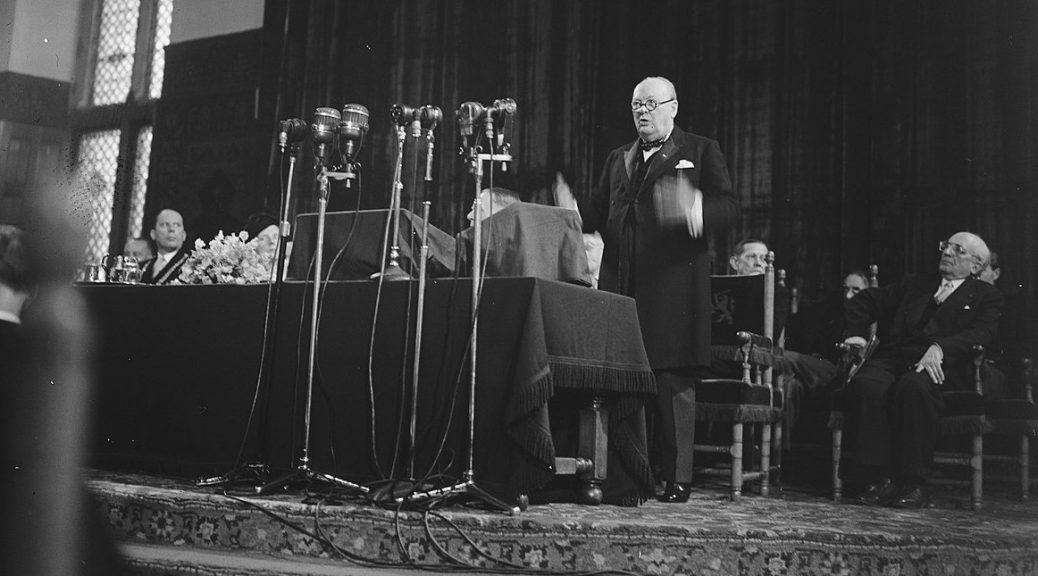
Q&A: Human Rights Tried by European Court
Excerpted from “Churchill on the European Court of Human Rights,” my essay for the Hillsdale College Churchill Project. To read the original article with endnotes, click here. To subscribe to weekly articles from Hillsdale, click here, scroll to bottom, and fill in your email in the box entitled “Stay in touch with us.” Your email address is never given out and remains a riddle wrapped in a mystery inside an enigma.
Q: Did he or didn’t he?
I recently heard on UK television that Winston Churchill supported the European Court of Human Rights. Since the ECHR is viewed by many here as a stumbling block to refusing entry to illegal aliens who are not refugees, this seemed to me extraordinary. Is it true? —D.J., Halifax, West Yorkshire
A: Yes and no
This is a new and interesting question. For answers we scoured our digital files of Churchill’s 20 million published words and 60 million about him. The evidence is that Churchill twice spoke in favor of a European Court of Human Rights. It is also reasonable to assert that jurisdiction of today’s ECHR is much broader than Churchill’s concept. It is therefore questionable to cite Churchill as a supporter of the European Court of Human Rights as currently constituted. But judge his words for yourself…
Brussels, 26 February 1949
The European Assembly is now on the point of being achieved…. We have now to take the second step forward and try to establish, as the practical result of our meeting here, the setting up of a European Court of Human Rights. Such a court in no way challenges the authority of a world court, but it may well be that the principles laid down by the United Nations will be better and more effectively interpreted by courts in the more limited and homogeneous area of regional units: Let Europe judge Europe…..
It must not be possible that, within the boundaries of United Europe, such a legal atrocity could be perpetrated as that which has confronted us all in the case of Cardinal Mindszenty.* Here you have the crime of religious persecution committed on an innocent man under the direct orders of Moscow….
London, 23 July 1951
Churchill’s second reference to the European Court of Human Rights came two years later in London. The essential requirement of the United Europe movement, he said, was amity between France and Germany. There must be no further wars of aggression such as Germany had unleashed five times from 1864 to 1939:
There can be no Europe unless it be based upon a solid foundation of trust and comradeship between the French and German peoples. Within the wider framework of the UNO [United Nations Organization] a Council of Europe has been set up. A European Army is beginning to take shape, and a European Court of Human Rights is shortly to be established….
I have long believed in the idea of a United Europe. In the turbulent year 1943 I said… “We must try to make this Council of Europe into a really effective league with a High Court to adjust disputes and with armed forces, national or international or both, held ready to enforce its decisions and to prevent renewed aggression.
Churchill then again added what he saw as Britain’s associated but unintegrated role: “[T]here are forces at work in Britain which will enable our island and our Empire and Commonwealth to play their full part.”
The European Court today
The European Court of Human Rights was established in 1959 by the Council of Europe. The Council (currently 46 states) is often confused with the European Union (27 states). The Council of Europe cannot make laws, although it can enforce agreements. The EU is entirely separate, has greater regulatory authority and its own Court of Justice.
Britain has long been one of the most welcoming countries to refugees, most recently from Ukraine. It is also currently experiencing about 50,000 undocumented arrivals a year on its Channel shores. Many of these are not refugees, some are criminals and traffickers. It is asserted that the European Court of Human Rights forbids Britain from taking action to refuse entry to anyone claiming to be a refugee.
Protocol 4 of the European Convention on Human Rights, which the ECHR enforces, includes the right “to freely move within a country once lawfully there; and to enter a country of one’s own nationality.” It prohibits “the collective expulsion of foreigners.” Concerned that this might nullify national laws, the UK and other countries have never ratified Protocol 4.
“Ally and friend”
How would Churchill view the jurisdiction of today’s European Court over British immigration law? We cannot judge, since he is not here to ask, though we may draw conclusions. How he felt with regard to integration with United Europe is however on record:
Our attitude towards further economic developments on the Schuman lines [European Coal and Steel Community] resembles that which we adopt about the European Army. We help, we dedicate, we play a part, but we are not merged with and do not forfeit our insular or Commonwealth character. Our first object is the unity and consolidation of the British Commonwealth…. Our second, “the fraternal association” of the English-speaking world; and third, United Europe, to which we are a separate closely—and specially-related ally and friend.
_______
*József Mindszenty was a Catholic cardinal and Archbishop of Esztergom in Hungary who opposed both the Nazis and the communists. As Churchill spoke, he was the victim of a a show trial. Convicted, he was imprisoned and tortured by the communist government. Freed during the Hungarian revolt of 1956, he took refuge in the U.S. Embassy. There he lived for 15 years before being allowed to leave Hungary in 1971. He died in exile in Vienna in 1975.
Further reading
Andrew Roberts, review of “Churchill on Europe” by Felix Klos, 2016.
Richard M. Langworth, “EU and Churchill’s Views,” 2015.






